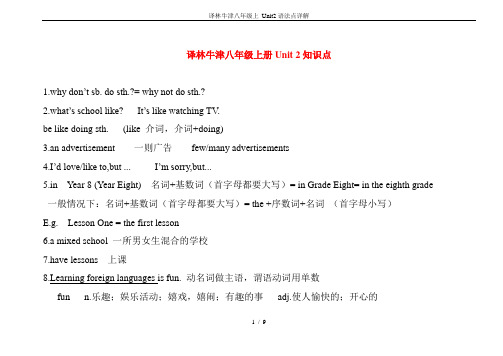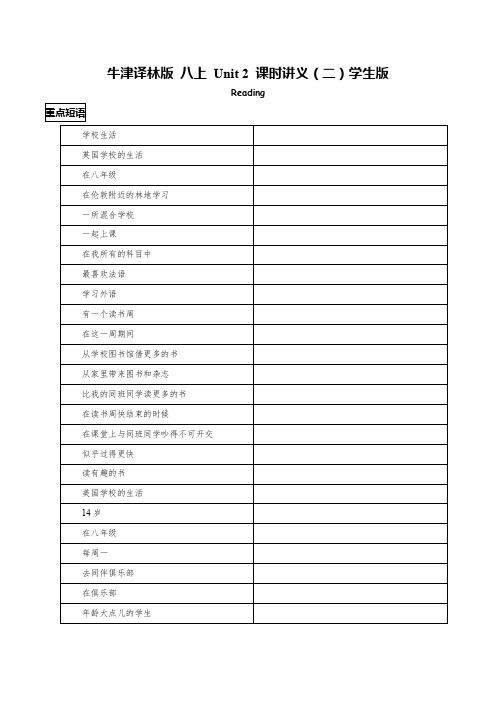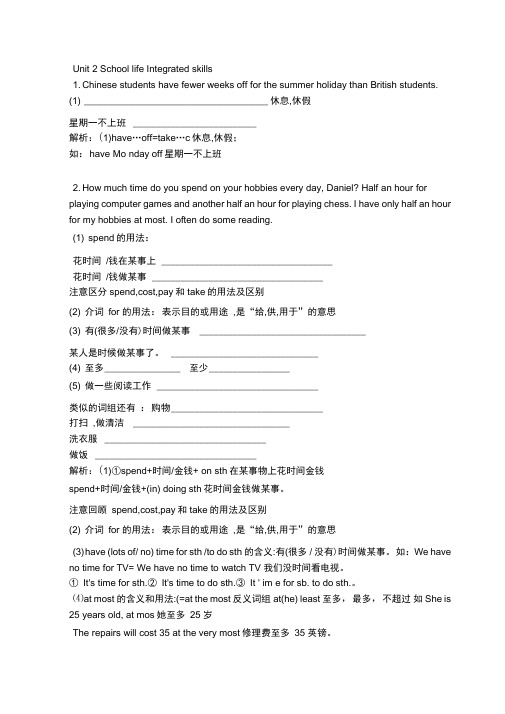英语初二上牛津译林unit2:学案02(综合技能和发音知识讲解)
最新译林牛津版初中英语八年级上册Unit 2 School life Integrated skills公开课教学设计(2)

Homework
1.Make up their own conversation by imitaing the contents they’ve learned..
2.In order to know school life in the countries where English is spoken, ask the questions about reading to know impor tant information.
Step2 Presentation
2.Ask Ss to listen to the recording twice and finish the table in PartA and check the answers. Pause the recording for the secon d time after each answer to give Ss more time to write down the answers if necessary.
Step3Reading
1.Let Ss go through Daniel’s article before they do the exercise in PartA2 on p.32 and check if they understand it. Ask Ss to do the exercise alone with the information in PartA1, then check the answers with their parters. Check the answers with the whole class and read the passage aloud.
Unit2知识点讲解牛津译林版英语八年级上册

牛津译林版8AU2知识点讲解1.知识目标:学生能够掌握U2的短语和词汇。
2.技能目标:学生能够掌握U2单词的用法。
3.情感目标:学生能够学会自己学会安排学校的活动。
Comic&Welcome to the unit知识点01.why don’t...?用法【用法详解】含义:为什么不.......?,通常表示建议和责备,相当于why not+动词原形例:1.why don’t dogs go to school?为什么狗不用上学?2.Why don’t you play basketball with me?=why not play basketball with me?为什么不和我一起打篮球呢?【典例讲解】1.翻译:为什么不在你生日开个派对呢?(两种译法)__________________________________________________________________________________________________________________________2.-------Are you going to try out for the host of the English party?-------______?It is such a good chance to improve my spoken English.A.what’s upB.What’s wrongC.Why meD.Why not知识点02.have to用法【用法详解】1.have to do sth,意思为不得不做某事,含有因为外界原因而造成的结果的色彩。
2.must do sth,意思为必须,表示人主观上的看法,是主观上的必须。
例:1.Because we are cleverer than people,they have to work harder.因为我们比人聪明,他们不得不工作更努力。
译林牛津八年级上 Unit2语法点详解

译林牛津八年级上册Unit 2知识点1.why don’t sb. do sth.?= why not do sth.?2.what’s school like? It’s like watching TV.be like doing sth. (like 介词,介词+doing)3.an advertisement 一则广告few/many advertisements4.I’d love/like to,but ... I’m sorry,but...5.in Year 8 (Year Eight) 名词+基数词(首字母都要大写)= in Grade Eight= in the eighth grade 一般情况下:名词+基数词(首字母都要大写)= the +序数词+名词(首字母小写)E.g. Lesson One = the first lesson6.a mixed school 一所男女生混合的学校7.have lessons 上课8.Learning foreign languages is fun. 动名词做主语,谓语动词用单数fun n.乐趣;娱乐活动;嬉戏,嬉闹;有趣的事adj.使人愉快的;开心的1 / 9funny adj.滑稽的,可笑的what (great/good) fun! have fun (in)doing it is fun to do (都不要冠词)9.borrow “借入” lend “借出”borrow sth. from sb. 向某人借某物lend sth. to sb. 把某物借给某人10.seem to do sth. 似乎做某事seem (to be) +adj.E.g. He seems(to be) unhappy today.他今天似乎不高兴。
11.offer sb. sth. = offer sth. to sb. 向某人提供某物12.an article 一篇文章what else = what other things13.any other +名词单数= the other +名词复数any other boy = the other boys14.spend ... on sth. / (in) doing sth. 花费......做某事15.wear uniforms 穿着校服wear ties 打着领带16.do morning exercises 做早操exercise “锻炼”不可数,其余都可数17.have (some time )off 休息(一段时间)18.have time for something “有时间做某事”19.go on a school trip 进行一次学校旅行2 / 920.half an hour 半小时three hours and a half= three and a half hours 三个半小时21.have an English test 进行一次英语测试read newspapers and magazines 读报刊杂志22.at weekends= at a weekend=on weekends= on a weekend 在周末练习一、单项选择题( ) 1. People in the UK say “lorry” while people in the USA say “”.A. hallB. elevatorC. truckD. soccer( ) 2. If it next Sunday, you still the Great Wall?A.will rain; do; visitB. will snow; will; visitC. rains; do; visitD. rains; will visit( ) 3. He always looks . N ow he’s looking at his new drawing.A. happy; happilyB. happy; happyC. happily; happilyD. happily; happy( ) 4. What’s your best friend like?A. He is fine. Thank you.B. He is a doctor.3 / 9C. He likes watching TV.D. He is helpful and generous.( ) 5. Chinese students have weeks in the summertime than American students.A. more; onB. fewer; onC. more; offD. less; off( ) 6. I have money than you, but I have friends than you.A. more; moreB. less; moreC. fewer; moreD. more; less ( ) 7. I feel ______ because my job is too ______.A. bored, boringB. bored, boredC. boring, boringD. boring, bored ( ) 8. –What makes you so ________ today, Jack? It is your first day of school.--Because my teacher says I am ________ honest boy.A. happily; anB. happily; aC. happy; aD. happy; an( ) 9. Mr Fat has _______ money than Mr Thin, but he has _______ friends.A. more, fewerB. more, lessC. fewer, moreD. less, less( ) 10. The taxi is going faster than the bus.A. veryB. muchC. moreD. most( ) 11. This problem is ________ that one.4 / 9A. not as easy asB. more easy thanC. not as easier asD. not easier than( ) 12. Yao Ming is one of ________ basketball stars in the USA.A. much popularB. more popularC. most popularD. the most popular( ) 13. Nancy spent half an hour ________ the piano every day.A. to practice playingB. practising playingC. practising to playD. to practise to play( ) 14. ----Would you please not smoke here? Look at the sign. ---- ________.A. No, I willB. Yes, I willC. Sorry, I willD. Sorry, I won’t ( ) 15. My little brother is generous ___his friends.He’d like to share toys ____ them.A. for, toB. to, withC. to, forD. for, with( ) 16. Please do the exercises as _____as you can in the English exam.A. wellB. goodC. betterD. best5 / 9( ) 17. Mike’s father always makes him _____ some housework on Sundays.A. to doB. doingC. doD. does( ) 18. Mum, I am so hungry. Could I have _____________?A. anything eatingB. anything to eatC. something eatingD. something to eat( ) 19. My hometown is ____________ beautiful than his.A. very muchB. more muchC. much moreD. very more ( ) 20. A lot of people tried their best, but ______ people won the prize.A. a fewB. fewC. littleD. a little ( ) 21. In China, most schools are ________ school.A. mixB. mixingC. mixedD. mixes ( ) 22. Amy scored the _____ points in swimming.I hope she can do better next time.A. lessB. leastC. fewerD. fewest ( ) 23. In our school library, there _____a number of books on science and6 / 9the number of them _______growing larger and larger.A.Is; areB. are; isC. is; isD. are; are( ) 24. She is better at English than ______in the class.A . any other student B. the other studentC . the one of any other student D. those of any other student( ) 25. We lost the match because they had _______players.They had eleven and we had only nine.A . strongerB . youngerC . fewerD . moreKeys: 1—5 CDADC 6-10 BADAB 11-15 ADBDB 16-20 ACDCB 21-25 CDBAD二、词汇A) . 请根据句意或括号中的中文提示、英文释义,写出句中所缺单词使句子通顺。
牛津译林版八年级上Unit2 第2课时 教案 讲解分析 习题设计

Period Ⅱ: Reading(第二课时)第一部分教案设计教学内容Reading(第20页),本课时主要学习Reading A文章的内容,了解英美国家不同的学校生活。
教材分析“Reading”部分A,阅读一个名为“世界各地的学校”友俱乐部站上的有关英国和美国学校的文章,学习并掌握大量的词汇、短语、有用的表达法;与此同时,了解英美学校的不同,不同国家的文化差异。
教学目标基础知识掌握词汇:French, during, end,foreign, discuss, baseball, win,Language, offer词组:in Year 8 ,during the week,in class,a Reading Week , discuss sth with sb , seem to, help new students learn more about the school ,listen carefully to my problems , offer sb help, do sports together play baseball, every time ,last month句型:Boys and girls have lessons together.Among all my subjects, I like French best.Learning foreign languages is fun.I often read more books than my classmates.Time seems to go faster when we are reading interesting books.On Friday afternoon, our school ends earlier than usual.Our team won two games last month.基本技能1了解英美国家中学生的校园生活。
牛津译林版八年级上Unit2Integratedskills学案

主备:审核:日期:学校________ 班级____________ 姓名__________ 家长签字_______【板块要点】一、教学目标1. 能根据听力中的信息将语篇补充完整。
2. 通过听说读写的训练,进一步巩固物品的数量语法知识。
3. 通过话题讨论,能够正确谈论花在兴趣爱好上的时间。
二、教学重点、难点1. 能熟练运用表示数量的词组来表示物品的数量及听力技能和会话技能的培养。
2. 通过听力的训练不断提高自己的听力技能和技巧。
三、词汇、短语1. spend (v.) 花费-- spent – spent;spend time on/(in) doing sth. 花时间做某事2. uniform (n.) 制服wear school uniforms穿校服3. chess (n.) 国际象棋play chess 下棋4. at most 至多,不超过;at least 至少5. the number of the students 学生的数量exercise (n.) 操,练习;do morning exercises 做早操;do eye exercises 做眼保健6.exercise (v. & un.) 运动,锻炼;exercise every day 每天锻炼;do some exercise做运动7. have more weeks off ……放更多天数的假8. work hardest 学习最刻苦9. have half an hour for playing chess 有半个小时下棋10. go swimming for half an hour 去游泳半小时11. do some/the reading 阅读do some shopping/ cooking/ washing/ cleaning三、句型(语法)1. the number of 与a number of的区别:“the number of +复数名词+单数谓语”表示“……的数量”2. have fewer weeks off 少休息几个星期3. spend花费,其主语必须是人,常用于以下结构:spend time/ money (in) doing sth.花费时间/金钱做某事spend time/ money on sth. 在….上花费时间/金钱It takes sb. some time to do sth.sth cost sb…sb pay…for…4. How much time …….?How long …….?主备:审核:日期:学校________ 班级____________ 姓名__________ 家长签字_______【课前导学】一、翻译短语1. 学生数2. 暑假3. 休假两天4. 穿制服5. 做早操____6. 花半小时做作业___7. 下棋__________ 8. 打电脑游戏9.阅读_________ 10. 在这三所学校当中11. 至多花半小时在业余爱好上___________________________________12. 你呢?/你怎么样?________________________________________二、课堂活动准备1. Listen to the tape of speak up and answer questions1).How much time does Daniel spend on his hobbies? Daniel2).How much time does Millie spend on her hobbies?3).How much time does Simon spend on his hobbies? Simon4).How much time does Amy spend on her hobbies? What does she do?2. Ask the students to work in pairs1).the boys read Daniel’s words and the girls read Millie’s words2).The boys and the girls change each other3..Translate the phrases into Chinese①半小时②至多③.我们四人中【课堂学习】Step 1. One-minute talk.Say something about your school.Step 2. Speak up1. Students listen to the tape with some questions(判断正误).How much time does Daniel/Millie/Simon/Amy spend on his/her hobbies?What are their hobbies?2. Then read the conversation in different roles and talk about their hobbies in groups of four. Step3. Pre-listeningQuestions about our school:1. What’s the name of our school?2. How many students/teachers/classrooms are there?3. Do you have much homework to do?How many hours do you need to finish your homework?4. Do you wear uniforms? Do you like them? Why?5. Do you do morning exercises?6. How many days do you have in your summer holiday? (Teach: length)Step 4. While-listeningTask 1 T: Open your books on page 32. Look at Part A1 and read through the form below.(Make sure the students know what to do next. )Daniel ChinaWoodland School The UKNancyTask 2 Free talk: Ask the students to talk about the three schools in a few wordsaccording to the lists.Task 3 Fill in the blankets in Part A2Check the answers with the students.Read the passage and point out:have…off, in the summertime, spend time doingmore/fewer/less…than, be different fromTask 4 Finish Part A3 on page 33.Fill the form according to Part A1. Check the answers with the students.Step 5. Post-listening独立完成A4,核对答案。
牛津译林版八上Unit2课时讲义(二)学生版

牛津译林版八上Unit 2 课时讲义(二)学生版Reading1.I am in Year 8 at Woodland School near London. 我在伦敦附近的林地学习读八年级。
I’m in the 8th grade at... 我在……八年级______________:“在八年级”= ________________。
表示年级:______________________ = _____________________________。
2.It is a mixed school. 这是一所混合式学校。
mixed:adj.“男女混合的;混合的”。
_______:v.“(使)混合,掺和”。
______________ = ______________ “将A和B混合在一起”。
___________ “混合在一起”。
3.Among all my subjects, I like French best. 在所有的科目中,我最喜欢法语。
like...best:“最喜欢……”= ___________。
French:n.“法语”;adj.“法国的,法国人的,法语的”。
_________:n.“法国”。
__________:n.“法国人”。
复数:____________。
4.Learning foreign languages is fun. 学习外语很有趣。
foreign:adj.“外国的”。
___________:n.“外国人”。
动名词(短语)作主语:单个动名词(短语)作主语时,谓语动词用________形式。
5.During the week, we can borrow more books from the school library. 在这一周期间,我们可以从学校图书馆借更多的书。
during:prep. “在……期间;在……的过程中”。
borrow:vt.“借入”。
辨析:borrow/lend/keepborrow:“借入”,指从别人或别处借东西,为非延续性动词。
英语初二上牛津译林unit2:学案(重点难点讲解)

英语初二上牛津译林unit2:学案(重点难点讲解)1.Schoollife学校生活★life作“生活(状态)”“生计”解释时,既能够作可数名词,又能够作不可数名词。
如:①Wearelivingahappierlifenow.我们现在过着更幸福的生活。
②Theylivedahardinthepast.过去他们过着艰难的生活。
★life作“生命”解释时,作不可数名词。
如:①Doyouknowhowlifebegan?你明白生命是怎么样起源的吗?②Theyweresignsoflifeintheforest.森林中有过生命的迹象。
★life作“性命”解释时,作可数名词。
如:①Manyliveswerelostinthefire.许多人在火灾中丧了命。
②Theygavetheirlivestothefreedomoftheirpeople.他们为人民的自由献出了生命。
★life作“生物”“活的东西”解释时,作不可数名词。
如:Isthereanylifeonthemoon?月球上有生命吗?2.What’sisschoollike?上学是什么样的?It’slikewatchingTV.上学就像看电视。
其中的like为介词,意为“像……”。
如:①What’satornadolike?龙卷风是什么样的?②What’sanearthquakelike?地震是什么样的?③It’slikebeingonaboat.这就像在船上一样。
【注】like作动词,意为“喜爱”,后接名词、代词、动词不定式或动词-ing形式作宾语。
请比较:①IlikewatchingTV.我喜爱看电视.②SchoolislikewatchingTV.上学就像看电视。
3.It’slikewatchingTV,buttherearefeweradvertisements.上学就像看电视,然而广告较少。
此句是存在句,主语是advertisements,fewer是few的比较级,意为“更少的”,修饰可数名词复数,不能修饰不可数名词。
译林版八年级上册英语Unit2SchoollifeIntegratedskillsandTask讲解

Unit 2 School life Integrated skills1. Chinese students have fewer weeks off for the summer holiday than British students. (1) ___________________________________ 休息,休假星期一不上班__________________________解析:(1)have…off=take…c休息,休假;如:have Mo nday off星期一不上班2. How much time do you spend on your hobbies every day, Daniel? Half an hour for playing computer games and another half an hour for playing chess. I have only half an hour for my hobbies at most. I often do some reading.(1) spend的用法:花时间/钱在某事上____________________________________花时间/钱做某事____________________________________注意区分spend,cost,pay和take的用法及区别(2) 介词for 的用法:表示目的或用途,是“给,供,用于”的意思(3) 有(很多/没有)时间做某事 ___________________________________某人是时候做某事了。
_______________________________(4) 至多________________ 至少_________________(5) 做一些阅读工作__________________________________类似的词组还有:购物________________________________打扫,做清洁 _________________________________洗衣服__________________________________做饭__________________________________解析:(1)①spend+时间/金钱+ on sth在某事物上花时间金钱spend+时间/金钱+(in) doing sth花时间金钱做某事。
- 1、下载文档前请自行甄别文档内容的完整性,平台不提供额外的编辑、内容补充、找答案等附加服务。
- 2、"仅部分预览"的文档,不可在线预览部分如存在完整性等问题,可反馈申请退款(可完整预览的文档不适用该条件!)。
- 3、如文档侵犯您的权益,请联系客服反馈,我们会尽快为您处理(人工客服工作时间:9:00-18:30)。
英语初二上牛津译林unit2:学案02(综合技能和发音知识讲解)
本卷须知
1.答题前,考生先将自己的姓名、准考证号填写清楚,将条形码准确粘贴在考生信息条形码粘贴区。
2、选择题必须使用2B铅笔填涂;非选择题必须使用0.5毫米黑色字迹的签字笔书写,字体工整、笔迹清楚。
3、请按照题号顺序在各题目的答题区域内作答,超出答题区域书写的答案无效;在草稿纸、试题卷上答题无效。
4、保持卡面清洁,不要折叠,不要弄破、弄皱,不准使用涂改液、修正带、刮纸刀。
8AUNIT2SCHOOLLIFE知识讲解
学习内容------综合技能和发音
SANDYISHELPINGHIMCOLLECTINFORMATIONONTHEINTERNET.
桑蒂正在帮他在网上收集信息
句中的COLLECT指有目的地,精心地去“收集”“采集”.如:
WEARECOLLECTINGMONEYFORHOPEPROJECT.
我们正在为希望工程筹款.
HISBROTHERISINTERESTEDINCOLLECTINGSTAMPS.
他弟弟对集邮感兴趣.
COLLECT的名词不达意为COLLECTION,意为“收藏品”.如:
INEEDONEMORESTAMPBEFOREICOMPLETEMYCOLLECTION.
我还需要一张邮票才能把这套邮票收集完整.
HEHASALARGECOLLECTIONOFOLDCOINS.
他收藏了大量的古硬币.
CHINESESTUDENTSHAVEFEWERWEEKSOFFINTHESUMMERTIMETHANBRITISHSTUDENTS.
中国学生夏天休假的时间比英国学生少几个星期.
HAVE…OFF意为“放假”.如:
HEHADTWOWEEKSOFFBECAUSEOFHISMOTHER,SILLNESS.
因为母亲有病他请了两周假。
WHYDIDYOUHAVETHEMORNINGOFF?
你上午为什么请假?
【注】其中HAVE可用TAKE替换。
如:
①SHETOOKAWEEKOFFLASTMONTH.
上个月她请了一星期的假。
如果准某人请假用GIVESB…OFF表达。
如:
HISBOSSGAVEHERTHREEDAYSOFFSOTHATSHECOULDLOOKAFTERHERSICKDAUGHTER.
老板准她三天假照顾生病的女儿。
3、BRITISHSTUDENTSSPENDLESSTIMEDOINGTHEIRHOMEWORKTHANCHINESESTUDENTS.
英国学生做家庭作业花的时间比中国学生少。
▲人作主语时,表示“花时间做某事”用SPENDTIME〔IN〕DOINGSTH.或ITTAKESSB.TIMETODOSTH.这两种结构。
如:
HESPENTTWOHOURSDOINGHISHOMEWORK.他花两小时做作业。
=ITTOOKHIMTWOHOURSTODOHISHOMEWORK.做作业花去他两小时。
【注】SPEND后也可接钱作宾语,而TAKE一般不用钱作宾语。
如:
②ISPENT15DOLLARSBUYINGTHEBOOK/ONTHEBOOK.我花十五美元买了这本书。
=IPAID15DOLLARSFORTHEBOOK.=THEBOOKCOSTME15DOLLARS.这本书花去我十五美元。
4、WHATIFITRAINSORSNOWS?如果下雨或下雪怎么办?
▲此句为省略句,WHAT是主句,IFITRAINSORSNOWS是条件状语从句,完整的句子应为:WHATWILLYOUDOIFITRAINSORSNOW?省略部分要根据上下文来理解。
如:WHATIFWEWON,TAKEYOURADVICE?
=WHATWILLHAPPENIFWEWON,TTAKEYOURADVICE?
如果我们没听你的劝告会发生什么?
WHATIFHECAN,TCOME?
=WHATSHOULDWEDOIFHECAN,TCOME?
如果他来不了我们该怎么办?
5、ITDOESN,TSNOWVERYOFTENHERE,ANDIDON,TMINDTHERAIN.
这不经常下雪,并且我不在乎下雨。
▲句中的MIND作及物动词,意为“介意”“在乎”,后接名词、动名词或IF引导的条件状语从句。
如:
DOYOUMINDGOINGTOTHEMEETINGINSTEADOFME?
你愿意代我去开会吗?
DOYOUMINDIFIBORROWYOURCAR?
我可以借用一下你的汽车吗?
【注】表示“同意/不反对”用NO,NOTATALL/OFCOURSENOT/NO,GOAHEAD;表示“不同意/反对”用IAMAFRAID…..。
如:
①“DOYOUMINDLENDINGYOURBIKETOME?”
“NO,NOTATALL./IAMAFRAIDI,IIUSEITMYSELF.”
“把你的自行车借给我好吗?”“好的。
/恐怕我自己要用。
”
6、ITISIMPORTANTTHATWEMAKEOURVOICERISEANDFALLCORRECTLYWHENWESPEAKENGLISH.
讲英语时用正确的升降调很重要。
ITISIMPORTANTTHAT这是一个以IT作形式主语,主语从句后置的句式。
为了句子的平衡,习惯上用IT作形式语,真正的主语从句放在表语之后。
IT和THAT在流语中都没有意义。
如:
①IT,SIMPORTANTTHATWESHOULDSTUDYENGLISH.我们学英语很重要。
②IT,STRUETHATWEHAVEMOREFREETIMETHANYOU.确实,我们的空闲时间比你们的多。
7、句子的升降调
▲升调:一般疑问句:
表示惊奇的省略句;
选择问句第一个选择部分;
并列结构中除最后一部分以外的所有并列部分;
降调:陈述句;
特殊疑问句;
选择问句最后一个部分;
并列结构的最后一个部分
如:IAM13YEARSOLD.〔↘〕
AREYOUASTUDENT?〔↗〕
AREYOUADOCTOR〔↗〕ORATEACHER?〔↘〕
WHAT,SYOURFATHER?〔↘〕
WESTUDYMATH〔↗〕,ENGLISH〔↗〕ANDCHINESE.〔↘〕
﹛①MRLIISGOINGTOBEONTVTONIGHT.〔↘〕
﹛②MRLI〔↗〕
{①I,MGOINGTOSELLMYHOUSE.〔↘〕
﹛②SELLWHAT?〔↗〕
8.SHEWON,TBEABLETOPLAYBASKETBALLFORTHREEMONTHS.
她将三个月不能打篮球。
▲BEABLETODOSTH.意为“能做某事”,指事实上能做成某事,相当于MANAGETODOSTH.如:
THEFIRESPREADQUICKLYTHROUGHTHEBUILDINGBUTTHEPEOPLEWEREABLETORUNOUTOFIT.
火在大楼里蔓延得很快,但人们还是都逃了出来。
HEFELLINTOTHERIVERBUTHEWASABLETOSWIMTOTHEBANK.
他掉到河里了,但他设法游到了岸边。
【注】CAN一般指人“现有的做事的能力”,表示最终的结果。
如:
①ICANDRIVEACAR.我会开汽车。
②MANCANMAKETOOLS.人会制造工具。
